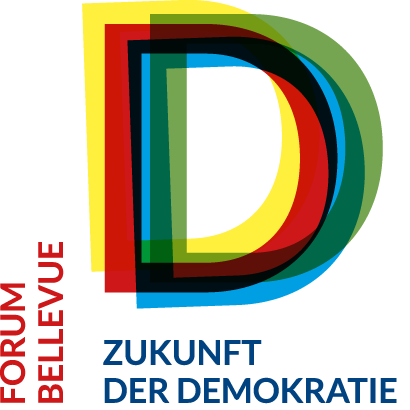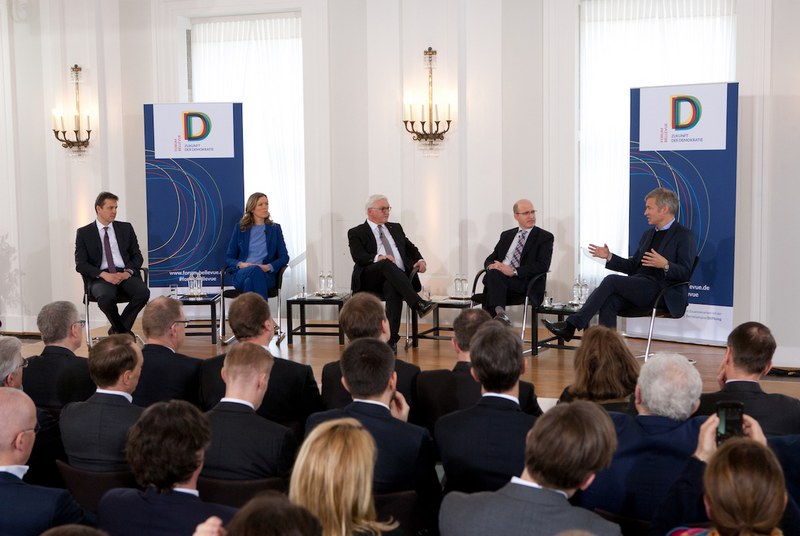"Fact or Fake? An Important Distinction for Democracy"
21 March 2018
What role do the media play in the future of democracy and how is digitalization shaping opinions? These are the questions addressed by Federal President Steinmeier together with journalists and scholars at the third "Forum Bellevue on the Future of Democracy".
"Freedom of expression is a farce unless factual information is guaranteed." Federal President Frank-Walter Steinmeier opened the third event in the "Forum Bellevue" series with this quote from Hannah Arendt. How can universal facts be conveyed in an era defined by digitalization and globalization? How can the media reach people who are guided by "gut feelings" or emotions rather than facts when forming their opinions? These challenges were the topic of a discussion held by Federal President Steinmeier and journalists and scholars.
"Fact or fake? On an important distinction for democracy" was the subject of heated debate both on and off the podium, with the invited guests contributing their views. The invited guests included: Michael Butter, Professor of American Studies and expert on conspiracy theories at the University of Tübingen, Jeff Mason, White House correspondent for Reuters news agency, Ulf Poschardt, Editor-in-Chief at Die Welt and Julia Stein, Head of the Politics and Research Department at German broadcaster NDR and Chair of a media research network (Netzwerk Recherche).
Despite all the changes brought about by social media, Professor Butter reminded the participants that untruths and conspiracy theories are by no means a product of the 21st century. The last U.S. election campaign between Donald Trump and Hillary Clinton was not the first involving numerous false claims and unsubstantiated accusations. Back in 1800, many lies were told during the election campaign between John Adams and Thomas Jefferson, including Adams' claim that his opponent was no longer alive. Rumors like this could persist at the time because the public did not have broad access to information; today, such information spreads like an epidemic, said Federal President Steinmeier. It is very difficult to oppose such rumors because social media has flattened out the "information hierarchies" upon which classical media outlets have relied.
As the Federal President noted, social media have also facilitated the silo mentality among the public that we now face. "Parallel worlds have emerged in which self-affirmation prevails through an exchange with like-minded people, and everything that contradicts one's own point of view fades into the background," said Steinmeier.
Ulf Poschardt identified two key challenges for journalism: the ongoing attempt to delegitimize the media as "Systemmedien" (media controlled by "the system"), regardless of whether they are public or privately run, and the changing economic context for work in journalism.
How should the media and the public respond to this development? As Federal President Steinmeier put it, how can the media ensure that it serve its function as "islands of reliability upon which we base our judgment"?
Jeff Mason recommended that everyone "get up earlier" – literally: He explained that given the U.S. President's penchant for Twitter tirades usually sent out early in the morning, he and his colleagues can no longer wait for the next press conference. Instead, they start following social media at six o'clock in the morning. "A few years ago, our Washington office didn't open until seven, that's all over now," stated Mason. But this is not enough for the media to gain acceptance. Professionalism, diligence and a culture open to handling mistakes are crucial, added the journalist Julia Stein. This includes having media that are guided by facts and reason rather than "rumors or moods." In addition, journalists need to tell the "stories of citizens" so they can recognize themselves in and identify with the content.
But it won't be enough if only the media adapts to the changed channels and means of communication, added Ulf Poschardt. Strengthening media literacy among the population – which should be taught at schools – is also necessary. Responding to this issue, the Federal President noted with appreciation the considerable effort already being made by schools and media institutions and pointed to the responsibility of journalism and publishers to impart media competence.
While the current situation may seem challenging and confusing, the participants also identified a number of positive developments, particularly with regard to an increase in media consumption and improved accessibility to information. "There's more reading than ever before. Whether this involves newspapers or digital forms. People have a growing need for political content," said Poschardt. The Brexit decision and Donald Trump's electoral success have been wake-up calls leading to an increase in the demand for professionally produced content. People have come to appreciate more deeply the value of quality journalism, and more and more young people are becoming interested in journalism as a profession. Jeff Mason summed this up at the end of the event by noting that this is a positive consequence of our confusing and complex political and media world. And at the same time, the new emergent media are incentivizing classic journalism to do better.
The speech of the Federal President for the event can be downloaded here. (pdf).

